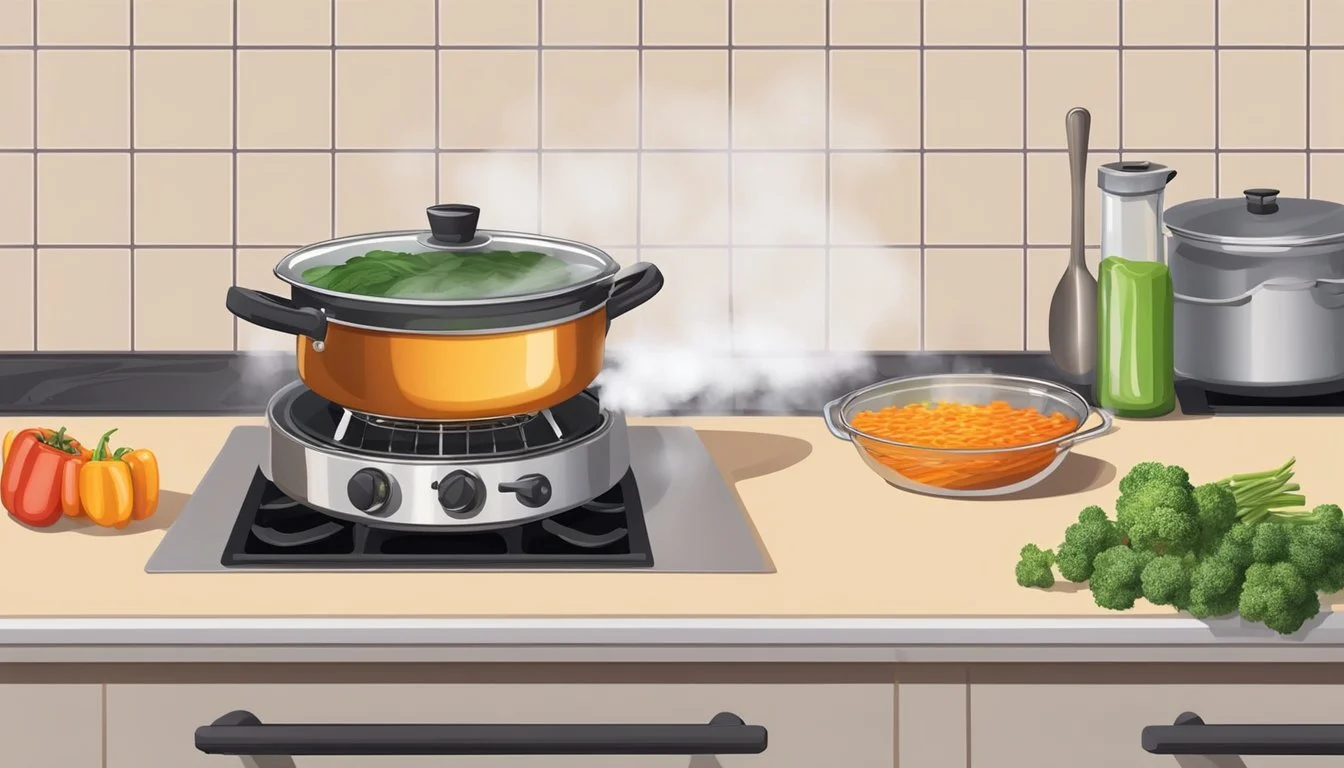How to Cook When You're Recovering from Illness
Simple & Nutritious Recipes
When recovering from illness, the body requires nourishment to regain strength and to support the healing process, making it essential to choose the right foods. Comforting meals that are easy to digest can provide the necessary nutrients without overburdening the digestive system. Foods such as chicken soup are traditionally known for their soothing qualities and nutritional benefits, which include a blend of vitamins, minerals, calories, and protein needed for recovery.
However, the act of cooking can be a daunting task when energy levels are low. It is beneficial to have a repertoire of simple recipes that require minimal effort and can be made with ingredients that are commonly on hand. A warm bowl of lemony lentil soup with greens or brown butter parmesan pasta, for example, can offer comforting flavors and textures while contributing to the body's recovery needs.
Smoothies and smoothie bowls serve as another excellent option, offering a versatile way to consume a condensed dose of nutrients with ease. Ingredients such as fresh fruits, vegetables, healthy fats, and proteins can combine to create a recovery-boosting meal. These dishes are not only nourishing but can also be comforting during a time when comfort is most needed.
Understanding the Impact of Illness on Nutrition
When one is sick, their body requires additional energy, specific nutrients, and adequate hydration to aid recovery. The immune system also depends on certain vitamins and a healthy gut to function optimally.
Energy Sources During Recovery
During illness recovery, the body's energy demands increase. Proteins are crucial as they help in the repair of tissues and support the immune system. An individual may need up to 1.2 grams of protein per kilogram of body weight. Carbohydrates serve as a primary energy source, and choosing complex carbohydrates can provide sustained energy. Fats, especially omega-3 fatty acids, can aid in reducing inflammation.
Hydration and Its Role in Healing
Hydration is pivotal for recovery as it helps maintain circulation, delivers nutrients to cells, and assists in the elimination of waste. A daily intake of fluids is essential, and it can come from water, soup broths, and infusions of fruits and herbs. Electrolyte-rich drinks can help replenish minerals lost during illness.
Necessary Vitamins and Antioxidants for the Immune System
Vitamins and antioxidants play a vital role in supporting the immune system. Vitamin C, for instance, stimulates the production of white blood cells and acts as an antioxidant. Foods rich in Vitamin C include:
Papayas
Bell peppers
Broccoli
Strawberries
Kiwi fruit
The Importance of Gut Health for Recovery
The gut health significantly impacts recovery and immune function. A diverse and balanced gut microbiota aids in nutrient absorption and protects against pathogens. Probiotic foods such as yogurt, kefir, and fermented vegetables can support gut health during and after recovery. Prebiotic foods, like bananas, onions, and garlic, provide the necessary fibers to feed healthy gut bacteria.
Safe Foods to Consume
When recovering from illness, it's crucial to focus on foods that are gentle on the stomach and provide essential nutrients without overwhelming the digestive system.
Low-Effort Nourishing Foods
Easy-to-prepare and digestible foods can be very beneficial when one's energy is low during illness recovery. Some examples include:
Bananas: Rich in potassium and easy to eat, they offer energy and are gentle on the stomach.
Rice: A bland carbohydrate that is comforting and provides energy without irritating the stomach.
Oatmeal: It's easy to make and soothing, plus it's full of nutrients that aid in recovery.
Yogurt: Contains probiotics that can help restore gut flora, and it's a good source of protein.
The BRAT and Other Bland Diets
The BRAT diet consists of foods that are typically recommended for gastrointestinal distress. They include:
Bananas
Rice
Applesauce: Gentle on the stomach and can help with digestion.
Toast: Easy to digest and non-irritating for most people.
Foods That Ease Digestive Discomfort
Certain foods are known to help with digestive problems, such as nausea or an upset stomach. These include:
Ginger: Can reduce nausea and promote stomach comfort.
Peppermint Tea: May ease digestive discomfort by relaxing the digestive tract.
Yogurt: The active cultures can help balance the gut microbiome.
Choosing foods from these categories can help ease one’s way back to a normal diet while ensuring nourishment during the recovery process.
Soothing Foods and Beverages
When recovering from illness, it's important to consume foods and beverages that are gentle on the stomach, boost hydration, and aid in healing. This section explores specific options that may offer comfort and support recovery.
Comforting Soups and Broths
Soups (What wine goes well with soups?) and broths are staples for convalescence due to their ease of digestion and nutrient content. Chicken soup, with its blend of protein, vitamins, and minerals, can help in strengthening the body's immune response. Adding ginger to soups can impart warming properties and potentially soothe digestive upset.
Chicken Soup with Caramelized Ginger: Incorporates the healing qualities of ginger with the classic comfort of chicken soup.
Classic Minestrone Soup: A vegetable-based soup that provides a variety of nutrients.
Healing Teas and Warm Beverages
Warm beverages can soothe the throat and provide comfort when one is feeling under the weather. Teas, particularly those with ginger or lemon, can offer warmth, hydration, and potentially anti-nausea effects.
Tea or Beverage Potential Benefits Ginger Tea May help with digestion and alleviate nausea Lemon Tea Can provide a dose of vitamin C and a refreshing flavor
Hydrating Fruits and Liquids
Proper hydration is crucial during recovery from illness. Fruits like bananas and avocados can maintain electrolyte balance, while acai bowls serve as a nutrient-dense option that promotes hydration.
Smoothie Bowls: Combine fresh fruit with liquids like coconut water or almond milk for a hydrating meal.
Hydration through Liquids: Clear broths and herbal teas contribute to fluid intake necessary for recovery.
In summary, opting for gentle, nutrient-rich soups and broths, sipping on warm healing teas, and ensuring adequate hydration through fruits and fluids, can support the body during its healing process.
Recipes for Recovery
When recovering from illness, a balanced diet rich in proteins, vitamins, and minerals is vital. Soups can provide hydration, while protein-packed and vegetarian meals ensure you receive ample nutrients to support the healing process.
Simple and Healing Soup Recipes
Chicken Noodle Soup: A classic remedy for illness, chicken noodle soup offers the benefits of hydration, the nutrition of vegetables, and the energy from the protein in chicken. It is a light yet fulfilling option.
Bone Broth: Rich in nutrients and easy to digest, sipping warm bone broth can be comforting and may promote gut health.
Lentil Soup: This vegetarian soup is full of fiber and protein, making it a hearty recovery meal that is also gentle on the stomach.
Easy Protein-Packed Meals
Chicken and Rice Soup: A simple dish that combines the lean protein of chicken with the carbohydrates of rice to provide a gentle yet nourishing meal that one can easily consume.
Salmon: Baked or grilled salmon (What wine goes well with grilled salmon?) is an excellent source of omega-3 fatty acids and lean protein, aiding in the recovery process. It can be paired with steamed vegetables or rice for a complete meal.
Nourishing Vegetarian Options
Vegetarian Soup: They are packed with a variety of vegetables providing essential nutrients without the heft of meat, perfect for a lighter meal.
Chickpea Spinach Stew: A combination of chickpeas and spinach can deliver a boost of iron and protein, essential for energy renewal during and after an illness.
Meal Preparation and Storage
When recovering from illness, efficient meal preparation and proper storage are vital for managing energy levels and ensuring a supply of nutritious meals that can be easily reheated.
Preparing Meals with Limited Energy
Individuals should focus on low-effort, nutritious meals that require minimal standing and prep time. Simple foods like stuffed sweet potatoes with hummus dressing can provide comfort and nutrition with little hands-on cooking. Casseroles are also a great option; they can be assembled quickly and baked without the need for constant attention. One simple method includes:
Preheat oven to the required temperature.
Layer pre-cut or frozen vegetables, precooked protein, and a grain like rice or quinoa in a baking dish.
Pour over a simple, homemade sauce or broth.
Bake until heated through.
Storing and Freezing Food for Later Use
Efficient storage helps extend the life of cooked meals (how long do cooked meals last?). To freeze a meal:
Allow the dish to cool completely to avoid condensation and freezer burn.
Divide the meal into portions.
Place portions in airtight containers or heavy-duty freezer bags.
Label with the date and contents.
For homemade soup, cooling and storing it in serving-size containers can make it easier to thaw and reheat. Simple foods like a casserole or a stuffed sweet potato can be wrapped in foil, then placed in freezer bags. Remember to cool food rapidly and consume within 3-4 months for the best quality.
Foods and Substances to Avoid
When recovering from illness, certain foods and substances can hinder the recovery process by inducing inflammation or aggravating digestive issues. It is important for individuals to be mindful of these items to promote a smoother and quicker recovery.
Reducing Inflammation by Avoiding Certain Foods
Inflammatory foods can interfere with the body's healing process. Those in recovery should consider avoiding or reducing:
Alcohol: It can increase inflammation and disrupt immune function.
Dairy: Some are sensitive to dairy, which can cause inflammation.
Foods That Can Exacerbate Digestive Issues
A sensitive digestive system requires gentle foods. Avoiding harsh substances reduces the risk of diarrhea and discomfort. Individuals should avoid:
Spicy foods: (What wine goes well with spicy food?) Can irritate the gut and exacerbate symptoms.
Caffeine: Stimulant that can cause dehydration and digestive unrest.





